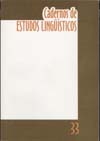Resumo
-Referências
AISSEN, J. (1979). The Syntax of Causative Constructions. New York: Garland Publishing, Inc.
BAKER, M. (1988). Incorporation: A Theory of Grammatical Function Changing. Chicago: University of Chicago Press.
CHOMSKY, N. (1991). “Some Notes on the Economy of Derivation and Representation” in Freidin, R., ed., Principles and Parameters in Comparative Grammar. pp. 417-454. Cambridge, Massachusetts: MIT Press.
______. (1993). “A Minimalist Program for Linguistic Theory” in Hale, K. and J. Keyser, eds., The View from Building 20. pp. 1-52. Cambridge: MIT Press.
______. (1995a). “Bare Phrase Structure” in Webelhuth, G., ed., Government and Binding Theory and the Minimalist Program, pp. 383-439. Cambridge, Massachusetts: Basil Blackwell.
______. (1995b). The Minimalist Program. Cambridge, Massachusetts: MIT Press.
CUNHA, C. and L. F. LINDLEY CINTRA. (1985). Nova gramática do português contemporâneo. Rio de Janeiro: Nova Fronteira.
GUASTI, M. (1989). Romance Infinitive Complements of Perception Verbs. MIT Working Papers in Linguistics 11: 31-45.
______. (1991). Incorporation, Excorporation and Lexical Properties of Causative Heads. Linguistic Inquiry 8: 209-232.
______. (1992). Causative and Perception Verbs. Ph.D. Dissertation, University of Geneva.
HALE, K. and S. J. KEYSER. (1993). “On Argument Structure and the Lexical Expression of Syntactic Relations” in Hale, K., S. J. Keyser, eds., Essays in Linguistics in Honor of Sylvain Bromberger, pp. 53-109. Cambridge, Massachusetts: MIT Press.
KAYNE, R. (1975). French Syntax. Cambridge, Massachusetts: MIT Press.
______. (1989). “Null Subjects and Clitic Climbing” in Jaeggli, O. and K. Safir, eds., The Null Subject Parameter, pp. 239- 261. Dordrecht: Kluwer.
______. (1991). Romance Clitics, Verb Movement, and PRO. Linguistic Inquiry 22: 647-686.
MAIER, N. (1996). A Minimalist Account of Romance Causatives. Ph.D. Dissertation, University of Iowa.
POLLOCK, J. (1989). Verb Movement, Universal Grammar, and the Structure of IP. Linguistic Inquiry 20: 365424.
QUICOLI, C. (1976). Conditions on Clitic Movement in Portuguese. Linguistic Inquiry 2: 199-223.
______. (1980). Clitic Movement in French Causatives. Linguistic Inquiry 6: 131-185.
______. (1982). Some Issues in the Theory of Clitics. Linguistic Inquiry 10: 203-273.
______. (1988). Inflection and Parametric Variation: Portuguese vs. Spanish. Unpublished mss., UCLA.
RAPOSO, E. (1987). Case-Theory and Infl-to-Comp: The Inflected Infinitive in European Portuguese. Linguistic Inquiry 18: 85-109.
REED, L. (1990a). Biclausality, Barriers, and the French Accusative Construction. Cahiers Linguistiques D’Ottowa 18: 79-94.
______. (1990b). “On Clitic Case Alternations in French Causatives” in Hirschbühler, P. and K. Koerner, eds., Romance Languages and Modern Linguistic Theory. pp. 205-223. Philadelphia: John Benjamins Publishing Company.
______. (1991a). The Thematic and Syntactic Structure of French Causatives. Probus 3.3: 317-360.
______. (1991b). French Clitic Case Alternation in a Parametric Theory of Linguistic Variation. MIT Working Papers in Linguistics 14: 227-240.
ROSEN, S. (1990). Argument Structure and Complex Predicates. New York: Garland Publishing, Inc.
SILVA, G. In progress. A Minimalist Analysis of Word Order in Brazilian Portuguese. Ph.D. Dissertation, University of Iowa.
STROZER, J. (1976). Clitics in Spanish. Ph.D. Dissertation, UCLA.
SUNG, M. (1990). On the Distribution of Clitics in French Causative Constructions. Romance Linguistics and Literature Review 3: 1-26.
TREVIÑO, E. (1994). Las causativas del español con complemento infinitivo. Mexico: Colegio de México.
O periódico Cadernos de Estudos Linguísticos utiliza a licença do Creative Commons (CC), preservando assim, a integridade dos artigos em ambiente de acesso aberto.

